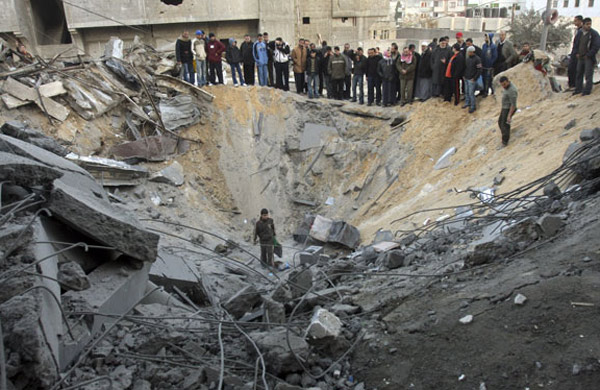Te gast: Amira Hass
At 3:19 P.M. Sunday, the sound of an incoming missile could be heard over the telephone. And then another, along with the children’s cries of fear. In Gaza City’s Tel al-Hawa neighborhood, high-rise apartment buildings are crowded close together, with dozens of children in every building, hundreds in every block.
Their father, B., informs me that smoke is rising from his neighbor’s house and ends the call. An hour later, he tells me that two apartments were hit. One was empty; he does not know who lives there. The other, which suffered casualties, belongs to a member of a rocket-launching cell, but no one senior or important.
At noon Sunday, the Israel Air Force bombed a compound belonging to Gaza’s National Security Service. It houses Gaza City’s main prison. Three prisoners were killed. Two were apparently Fatah members; the third was convicted of collaborating with Israel. Hamas had evacuated most of the Gaza Strip’s other prisons, but thought this jail would be safe.
At 12 A.M. on Sunday, a phone call roused S. “I wasn’t sleeping anyway,” he said. “I picked up the receiver and heard a recorded announcement in Arabic: ‘This is to warn you that we will bomb the house of anyone who has arms or ammunition at home.'”
Three members of one neighboring family were killed, all young men in their twenties. None of them owned arms or ammunition; they were simply walking down the street when the IAF bombed a passing car. Another neighbor lost a 16-year-old daughter, and her sister was seriously wounded. The IAF had bombed a building that formerly housed the Palestinian Authority’s Preventive Security Service, and their school was located next door.
S. saw the results of some of Saturday’s bombings when he visited a friend whose office is located near Gaza City’s police headquarters. One person killed in that attack was Hassan Abu Shnab, the eldest son of former senior Hamas official Ismail Abu Shnab.
The elder Abu Shnab, whom Israel assassinated five years ago, was one of the first Hamas politicians to speak in favor of a two-state solution. Hassan worked as a clerk at the local university and played in the police band for fun. He was performing at a police graduation ceremony on Saturday when the bomb struck.
“Seventy policemen were killed there, not all Hamas members,” said S., who opposes Hamas. “And even those who supported Hamas were young men looking for a job, a salary. They wanted to live. And therefore, they died. Seventy in one blow. This assault is not against Hamas. It’s against all of us, the entire nation. And no Palestinian will consent to having his people and his homeland destroyed in this way.”

